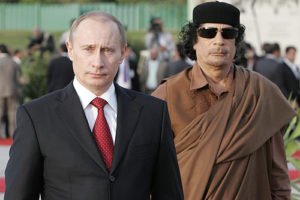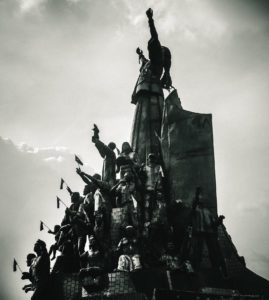Minds of the Movement
An ICNC blog on the people and power of civil resistance
by Ivan MarovicNovember 22, 2022
In the last decade, many countries have been backsliding into authoritarian rule. Serbia, the country where I was born, is one of them. This is a scary development that prompts us to focus on the democracy crisis, and many observers do. But there is another crisis brewing, largely unnoticed: the dictatorship crisis.

Vladimir Putin walks with former Libyan leader Muammar Gaddafi in Tripoli, Libya, April 2008. www.kremlin.ru (CC BY-SA 4.0, unedited).
It may sound like a paradox but currently authoritarian rule is experiencing a resurgence and going through a crisis at the same time. The resurgence is apparent, promoted even, but crisis is not being seen as authoritarian countries are less transparent than democracies and would rather keep their weaknesses hidden. They try really hard to present themselves as formidable foes and stable monoliths of power. So far they have managed to convince a lot of people, observers and dissidents, of their invincibility. But below this veneer, there is an underlying weakness, a gaping hole, a fundamental flaw that keeps every dictator awake at night: mortality.
We need to be clear, the crisis is not a collapse; the death of a dictator doesn’t mean the end of dictatorship. In fact, the death of a dictator is the least likely reason of the end of dictatorial rule, as a recent study has shown. That’s because most often someone else in their close circle takes their place. But that process is rarely smooth; more often than not, it is a total crisis.
The “S-word”: Succession
The dictatorship crisis is fundamentally a succession crisis. By having a dictator on top of the regime, a single individual who pulls the levers of power, the authoritarian system attaches the state apparatus to the living human being, infusing regime institutions with greed, paranoia, an illusion of grandeur and every other human flaw a person might have or develop while serving in this role. But most importantly, this person will die one day and somebody else will have to replace them. Succession is an extremely delicate moment when the state apparatus, attached to a mortal man, trembles, and its vulnerability becomes apparent to every apparatchik. It’s a bureaucratic near-death experience.

Gleb Pavlovsky was a political adviser to Vladimir Putin from 1996 to 2011. Since then, he has been a critic of the Russian government, living in exile. Credit: Evgeniy Isaev via Wikipedia (CC BY 2.0, unedited).
In order to understand the crisis that is succession in a dictatorship, we need to unpack the mechanism of personal rule. Any regime, any effort to rule over a society requires a team. And complex societies require large teams. But size comes with competing interests, animosities, mistrust and mutual fear. When the regime is ruling a country for its own benefit and at the expense of the population, divisions are only exacerbated. Corruption, embezzlement and crime are not activities known to generate harmony among the culprits, and the more power, wealth and influence they amass, the more they compete with each other. This is why a top dog, an autocrat on top of the pyramid, whether a mafia boss or a dictator is needed, to serve as an arbiter between competing factions so that they can function as a joint effort.
The regime of Vladimir Putin in Russia is a good example of this. Gleb Pavlovsky who was instrumental in solidifying Putin’s power in the early 2000s, said the following in an interview for Deutsche Welle in 2018:
“We forget that it’s not Putin who is running the country. Putin delegates to a small group of people the powers of the President. […] And these people do with them what they want. They sell them. They barter with them. These people are salesmen of presidential powers.”
Delegating power to others only increases with time. Even if the dictator rises to the top of the regime as a head of one of the factions, he slowly becomes a leader of a conglomerate of factions. And these become more cohesive with time. A dictator, in his role as arbiter, is the only one whose place is unquestioned. Everyone else is jockeying for a position. And he needs to be fair and even-handed, as long as he is not being challenged.
Subordinate competition and the heir apparent problem

EDSA People Power Monument representing millions of people who participated in ousting the former dictator of the Philippines, Ferdinand Marcos. Source: Flickr user Daniel Go.
Of course, history is filled with examples of loyal supporter purges as a result of the dictator’s paranoia. But here, we will focus on an even more common characteristic of regimes: subordinate fear that the dictator will favor one of the other factions with whom they compete. Naturally, the dictator must sometimes lean toward one faction and then toward another, but he will make sure to maintain balance overall and never let one of his subordinates grow strong enough to overwhelm the others.
This is why succession is so problematic for a dictator: when he appoints an heir, the dictator creates another center of power, for to exercise power potentially in the future is to have power in the present and an heir apparent becomes an arbiter too, at least potentially. In such a situation, if the dictator leans against a particular faction, competing factions have someone else to turn to. They can have hope that the new dictator, after he succeeds the current one, may overturn the decision. This creates such instability in the regime that dictators are careful not to appoint heirs, not even to discuss potential successors.
According to Boris Kagarlitsky, a Russian sociologist, this is exactly the problem Putin currently faces. Over the years, he repeatedly promised to launch the transition process but never did, because once he nominates a successor, he’s not fully in control anymore. A careful transfer of power from Putin to his successor was supposed to be outlined in the 2020 constitution. Kagarlitsky says that Putin was supposed to approve these changes, and he was going to become some kind of top ayatollah, like in Iran, but day-to-day rule was going to be conducted by someone else. But on the very same day the Duma was planning to vote for the amendment, Valentina Tereshkova, former cosmonaut and Duma member, suddenly called for the prolongation of Putin’s term in office. As soon as this was proposed, people’s representatives changed their mind and voted for prolongation.
Succession in other dictatorships: China under Xi Jinping’s rule
Similar developments can be observed in China. Since the death of Mao Zedong in 1976, the Chinese Communist Party has established a succession system which by the early 2000s became relatively orderly. Each new generation would be handpicked and prepared by the current leadership and would gradually take over the reigns of power.
The recent 20th Party Congress was originally supposed to be a moment for the sixth generation to ascend to power, but this didn’t happen. Xi Jinping, the current leader of China, who has been solidifying personal rule for a decade, made it clear that he intended to stay in power and scrapped any transition plans for this year. He may still have to fight some of his opponents in the future, but at the Congress in October he succeeded in winning a third term and consolidated his power. The collective rule of the Politburo was essentially replaced with personal rule, something China has not seen for half a century.
And with it comes the succession problem. Soon, China will be where Russia is today—without a clear succession mechanism.
So far I have shed some light on the internal dynamics of regimes, their inner circles and the problems associated with personal rule, especially the succession problem. In my companion post, we will discuss the implications for civil resistance movements—what opportunities does the dictatorship crisis present to movements?

Ivan Marovic
Ivan Marovic is Executive Director of ICNC. He was one of the leaders of Otpor, the student resistance movement that played an important role in the downfall of Slobodan Milosevic in Serbia. After the successful democratic transition in Serbia, Marovic began consulting with various prodemocracy groups worldwide and became one of the leading practitioners in the field of strategic nonviolent conflict.
Read More